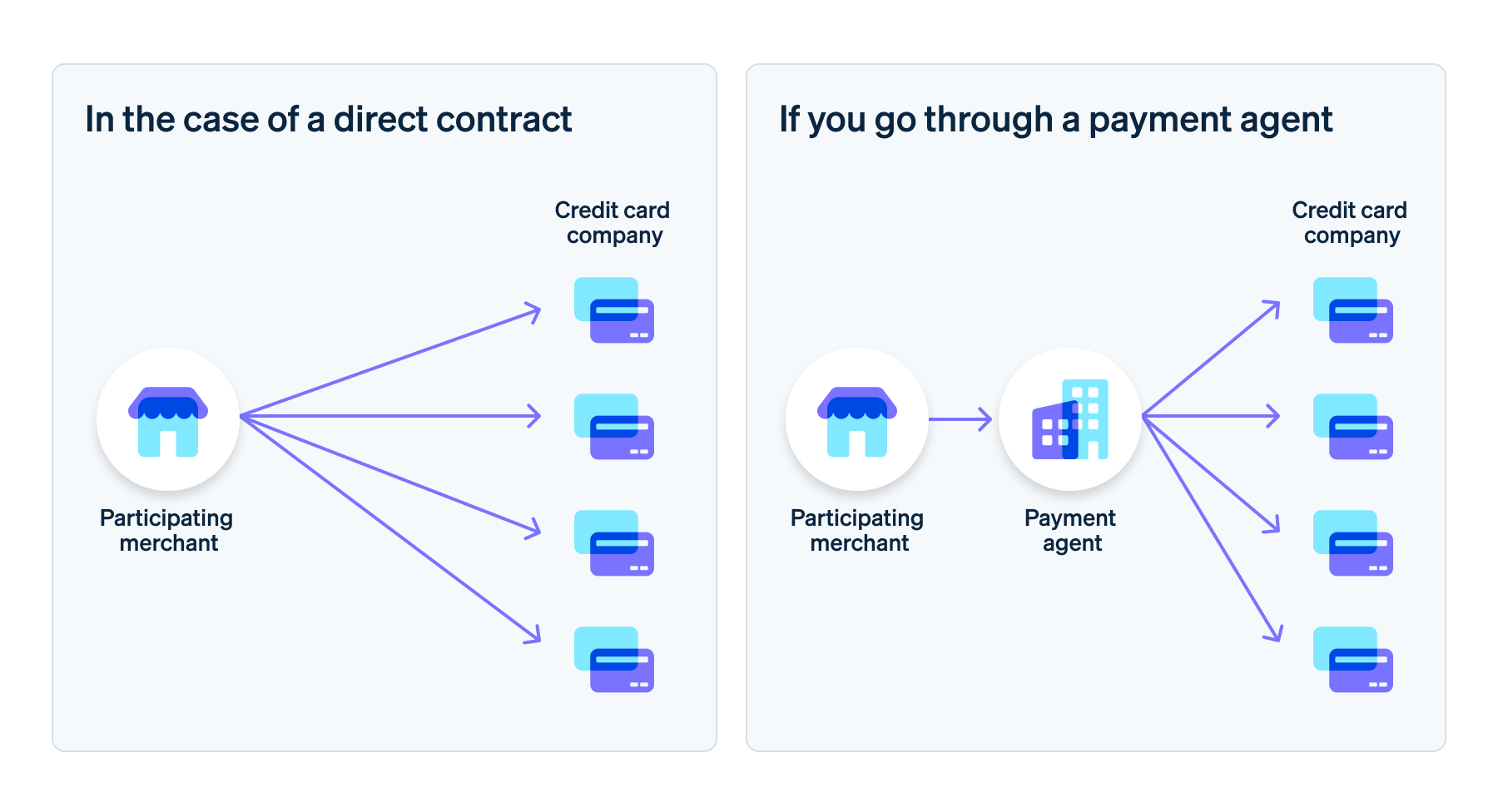支付代理公司为电商网站运营商与各类支付机构提供中介服务,处理信用卡交易、移动运营商计费和其他支付方式。
通常情况下,企业在引入支付系统时,需要与每个支付机构单独签约。而使用支付代理,只需与代理公司签订一个合同,就可以处理多种支付方式。
本文概述了这些支付代理的结构及其优势。
目录
- 什么是支付代理?
- 使用支付代理的好处
- 选择支付代理时的注意事项
什么是支付代理?
支付代理(也称为支付处理公司)代表支付机构提供服务。包括合同、程序、审核以及详细的交易信息管理等服务,以便商家可以使用多种支付方式。
例如,一家计划开设在线商店的电商网站运营商想要提供多种支付选项以方便顾客购买产品和服务。如果他们与每个支付机构直接签约,就必须分别处理每个选项,既耗时又费力。
支付代理的好处包括避免与众多机构分别签约,同时简化支付相关管理,因为销售和交易管理都集中在代理的系统内。它还减少了与支付相关的管理,因为销售和交易管理集中在代理的系统中。
此外,通过使用支付代理,公司可以避免与支付机构签署合同的复杂过程(通常需要单独处理),以及将他们的系统与每个支付机构集成的工作。这使企业可以在相对较短的时间内设置商店并准备一个完善的支付环境。
支付代理的作用
支付代理为网上商店、商铺、信用卡公司及其他机构提供交易系统和支付方法的中介服务。
在安全性方面,各种代理都实施了不同的安全措施。这些措施包括预防欺诈性付款,以及管理与延迟或未付款相关的风险。因此,支付处理公司必须遵守 PCI DSS等信息安全标准,以保护客户和支付相关信息。
它们帮助维护电商网站运营商与顾客之间的金融交易处理的效率和安全性。
支付代理的运作方式
为客户提供多种支付选项有助于企业接触更广泛的客户群体。
然而,随着支付方式的增加,客户支付信息的管理、各个机构交易的处理,以及保持所有信息的更新和有序也变得更加复杂。
为减轻商家的负担,支付处理公司也在各种机构之间充当中介,负责合同手续、审核以及客户支付所产生的存款和销售款项管理。这使企业可以轻松引入多种支付选项。

使用支付代理的好处
通过提供多样化的支付方式来满足网站访问者的多种需求,您可以吸引更多客户访问公司的电商网站并增加购买量。
以下是运营多种支付形式的业务时,使用支付代理带来的优势。
节省比较和考虑支付方式所需的时间
最适合您业务的支付方式可能会因业务的性质而有所不同。为此,近年来,许多支付处理公司将支付方式的比较和选择建议纳入了其服务范围。
除了提供支付选项建议外,支付代理还提供灵活响应用户需求的各种服务,例如会计软件和其他电商网站运营所需的工具和功能。
因此,使用支付代理的一个主要优势在于,它可以提供与业务运营本身相关的增值服务。
一份合同即可处理多种支付方式
如果您的支付代理支持,您可以引入多种方式,如银行转账、便利店支付和信用卡支付。
无需单独联系信用卡公司或便利店公司,所有合同均由代理集中处理。因为不需要为每个支付服务搭建内部系统或处理安全措施,您可以在无需大量时间和资源的情况下处理多种支付方式。
集中管理和简化安装和运营管理
如上所述,由于只需与一个支付代理签订合同,该代理可以快速高效地完成引入新支付方式所需的多个流程和安全相关工作。
此外,由于代理管理每个机构的交易数据,您可以在一个地方集中管理所有支付方式。
例如,在无现金支付中,每个机构的结算周期、付款日期和费用各不相同,财务管理和销售及会计流程会变得非常复杂。但使用支付代理后,他们的系统会为您整理和组织信息。
这意味着您会在一个支付日期以总额的形式收到扣除手续费后的总销售额。这减少了核对多个付款的工作并简化了销售管理。
选择支付代理时的注意事项
所有支付代理的共同特点是能够通过其服务引入多种支付方式。因此,您可能会认为无论选择哪家支付代理公司,所获得的帮助都是相同的。然而,各公司的服务内容和条件有所不同,建议您根据以下几点选择最适合您业务的代理。
支持的支付方式数量和类型
代理支持的支付方式数量和类型因公司而异。为了引入您需要的所有支付方式,选择提供所需选项的代理很重要。
例如,有许多支付方式,如运营商计费、二维码支付和银行转账,但并非所有支付代理公司都支持这些选项。
此外,重要的是预先确认每个支付代理公司支持哪些信用卡品牌。
Stripe 支持多种支付方式,包括便利店支付、银行转账和信用卡支付。Stripe 还提供与交易相关的多种功能,从实现到信息处理及收入管理。例如,通过引入 Stripe Payments,您可以在一个平台上满足多种支付需求。
随着数字化的推进,新的支付方式不断出现。如果您的支付代理无法提供新开发的选项,您将无法将其引入电商网站。为避免被迫更换代理,确定您评估的公司是否积极引入新服务和支付方式也很重要。
支付代理的业绩如何?
进行支付时总是涉及资金的转移,因此审查代理所提供服务的业绩和所实施系统的可靠性也很重要。
考察支付代理的操作情况,例如有多少公司使用其服务、服务的客户类型、其网站上是否有客户引入的案例研究,以及使用其服务的大小企业的比例。考察您所在行业中是否有公司使用某支付代理也是个好主意。
具有良好业绩的支付代理可能拥有较高的社会信任度。选择可信赖的公司,您可以更安心地依赖其支付处理服务。此外,如果代理有丰富的经验和专业知识,他们可能更善于利用过去的经验来优化服务。
是否可以降低服务成本?
通过支付代理引入无现金支付时,您需要向他们支付一定的费用,这些费用因代理而异。有时会有初始费用和月费等固定成本,而在其他情况下,可能有使用附加功能或服务的可选费用。
此外,基于交易量的费用会随着销售额增加而增加。因此,建议比较几家支付代理的费率,并从长期角度选择性价比高的代理。您还应该考虑代理的服务并将其成本与您的销售和预算进行比较。
安全性是否得到了适当保障?
引入支付代理意味着您将分享客户的个人财务信息,因此了解其安全环境并确保其具备足够的安全协议至关重要。这是选择代理时最重要的考虑因素之一。
检查安全环境时,一个关键因素是支付代理是否获得第三方组织的认证,以证明其系统的稳健性。PCI DSS 和隐私标志是此类认证的具体示例。您应检查该公司是否符合这些标准以及这些标志的意义。
此外,建议检查支付代理是否实施了 SSL/TLS 技术、3DS 验证(三域安全)、安全码等保护措施。
Stripe 符合PCI DSS国际安全标准,并采取了全面的保护措施来处理个人信息和交易数据,包括通过数据加密(SSL/TLS 技术)防止未经授权的访问。
有关支付相关安全措施的更多信息,请参阅支付安全:企业的深入、可操作指南。
本文中的内容仅供一般信息和教育目的,不应被解释为法律或税务建议。Stripe 不保证或担保文章中信息的准确性、完整性、充分性或时效性。您应该寻求在您的司法管辖区获得执业许可的合格律师或会计师的建议,以就您的特定情况提供建议。